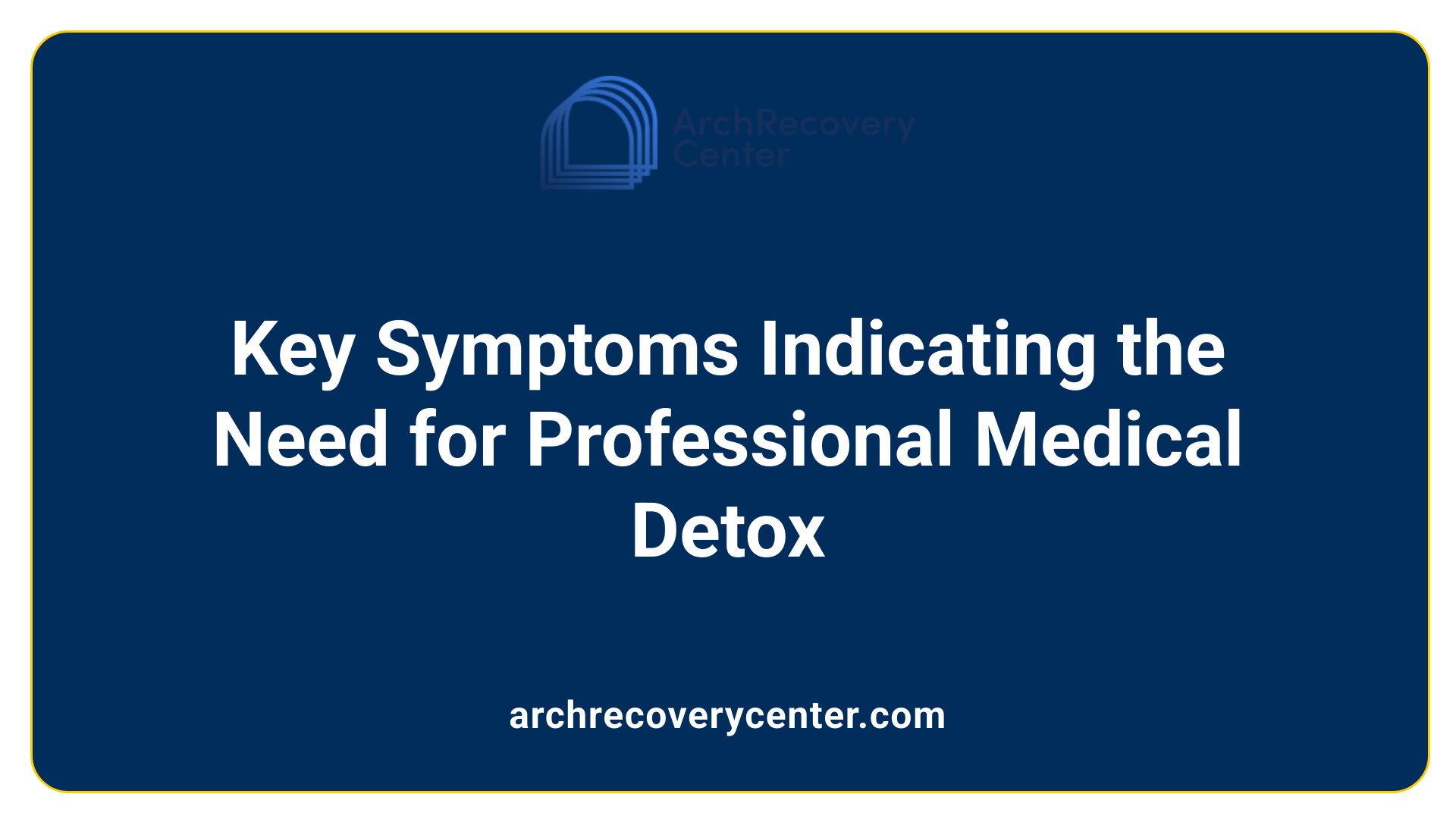Signs Your Loved One May Need a Detox Program

Introduction to Signs Indicating the Need for Detox
Substance use disorders are complex and challenging conditions that require attentive observation and early intervention. Recognizing the physical and behavioral signs of addiction is crucial in helping loved ones seek timely professional assistance. Detoxification is an essential first step in breaking free from addiction, but it must be conducted under medical supervision to ensure safety. This article explores the signs that indicate your loved one may need a detox program, why professional help is vital, and how to support them through this process.
Physical and Behavioral Signs of Substance Abuse and Addiction in Loved Ones

How can I recognize the physical and behavioral signs of substance abuse and addiction in loved ones?
Recognizing signs of substance abuse and addiction in loved ones requires keen observation of both physical and behavioral changes.
Physical changes may include poor hygiene, weight fluctuations—either gaining or losing weight unexpectedly—and red or bloodshot eyes. Unexplained bruises, cuts, or injuries can also be indicators of risky behaviors or accidents related to substance use. Physical signs such as slurred speech, poor coordination, or a distinct breath odor (like alcohol or fumes) also raise concern.
Behavioral indicators are equally telling. Secretive and evasive behaviors, such as avoiding questions or hiding objects, can suggest concealment of drug or alcohol use. Lying about activities or whereabouts, and withdrawing from social activities or family gatherings, are common signs.
Sudden mood swings, irritability, anxiety, and paranoia may appear, as well as aggressive outbursts or depression. Changes in sleep patterns—either insomnia or excessive sleep—may also be observed. Neglect of personal responsibilities, such as household chores, work duties, or school performance, often accompanies addiction.
Some signs are subtle but important. For example, smelling of alcohol or substances, or noticing unusual odors on clothing or in the living environment, can be clues.
Why is it important to spot early signs of addiction?
Early recognition of these signs can facilitate timely intervention, potentially preventing escalation to severe health, legal, or social consequences. Prompt action can lead to professional treatment and support, improving the chances of recovery.
What steps can I take if I suspect a loved one is struggling?
- Observe carefully without jumping to conclusions.
- Approach with compassion—use 'I' statements to express concern.
- Encourage open communication and offer support.
- Research local treatment options and consider family therapy or professional help.
- Seek advice from healthcare professionals or addiction specialists.
Resources for assistance
The SAMHSA’s National Helpline is a confidential, free, 24/7 resource to connect individuals and families to local treatment facilities, support groups, and community-based organizations. It does not provide counseling but guides to appropriate services, available in English and Spanish.
Recognizing these signs and acting with compassion and urgency can make a significant difference. Encouraging loved ones to seek professional help is a vital step toward recovery.
| Physical Signs | Behavioral Signs | Additional Indicators |
|---|---|---|
| Poor hygiene | Secretive actions | Unexplained injuries |
| Weight changes | Lying about activities | Changes in sleep patterns |
| Red or bloodshot eyes | Withdrawal from activities | Physical odors such as alcohol |
| Bruises or cuts | Mood swings & agitation | Neglect of responsibilities |
| Slurred speech and poor coordination | Anxiety or paranoia | Unusual odors in environment |
| Changes in physical appearance | Irritability or aggression | Signs of legal or financial issues |
Being aware of these signs and seeking professional help can support loved ones through their recovery journey, emphasizing the importance of early intervention and ongoing support.
When Detoxification Becomes Necessary: Recognizing the Critical Need

When is detoxification necessary for someone with substance use issues?
Detoxification is a crucial step in treating substance use disorders and becomes necessary when an individual displays signs of physical dependence on a substance. Physical dependence can be identified by withdrawal symptoms such as shaking, sweating, nausea, headaches, or more severe complications like seizures, especially with substances like alcohol or benzodiazepines.
The severity of withdrawal symptoms varies depending on the substance involved and the individual's health status. For example, alcohol withdrawal can lead to dangerous conditions such as delirium tremens (DTs), which require immediate medical intervention.
In addition to physical signs, the presence of co-occurring mental health conditions, such as depression, bipolar disorder, or anxiety disorders, can complicate detox efforts and often necessitate supervised care. If mental health issues are significant, medical detox provides a safer environment where symptoms can be managed effectively.
Past failed attempts to quit or reduce substance use independently are also strong indicators that professional detox is needed. Repeated unsuccessful efforts suggest that the individual’s body and mind are both heavily dependent on the substance and that withdrawal symptoms may be intense or difficult to handle alone.
Unsupervised detox without medical guidance can pose serious health risks, including severe withdrawal reactions, dehydration, or even death. Therefore, seeking medical detox at licensed facilities ensures safe management of withdrawal symptoms and increases the chances of successful recovery.
In summary, detoxification becomes a necessity when signs of physical dependence, intense withdrawal symptoms, or high relapse risk are present. Medical supervision ensures that detox is both safe and effective, serving as the foundation for subsequent addiction treatment and ongoing recovery efforts.
For more detailed information, search for "When is medical detox necessary" to explore available treatment options and guidance.
Identifying Symptoms That Indicate the Need for a Medical Detox or Detox Program

What are the symptoms indicating the need for a medical detox or detox program?
Understanding the signs that indicate the necessity for medical detox can be lifesaving. Severe withdrawal symptoms such as seizures, hallucinations, delirium tremens (DTs), dangerously high blood pressure, rapid heart rate, and uncontrollable tremors are critical indicators, especially in instances involving alcohol, opioids, or benzodiazepines. These symptoms reflect the body’s intense reaction to substances and require immediate medical attention.
Physical signs also provide crucial clues. Extreme nausea, persistent vomiting, muscle aches, excessive sweating, and headaches are common during severe withdrawal phases. Psychological symptoms such as severe anxiety, depression, irritability, and overwhelming cravings further highlight the need for professional management.
A pattern of increased tolerance—where more of the substance is needed to achieve the same effect—alongside frequent and unsuccessful self-quit attempts, suggests dependence and the importance of a structured detox program. Individuals with pre-existing health issues are at heightened risk and should seek medical detox to prevent complications.
In sum, when withdrawal symptoms escalate in intensity or frequency, or if dependence is suspected, prompt medical supervision becomes essential. Proper detoxification can mitigate potential life-threatening risks and set a safe foundation for ongoing treatment.
Supporting Your Loved One Through Detox: Education and Effective Assistance

How can I educate myself about the process and purpose of detox to support loved ones effectively?
Supporting a loved one through detox starts with understanding what the detox process involves. Detoxification, often called detox, is the medical procedure of removing harmful substances from the body. It is usually the initial step in addiction treatment and must be conducted under professional supervision because withdrawal symptoms can be severe or even life-threatening.
To gain a clearer picture, you can utilize resources like SAMHSA’s National Helpline at 1-800-662-HELP. This free, confidential service offers information and referrals to local treatment facilities, support groups, and community organizations in both English and Spanish. Educating yourself on the signs of withdrawal—such as nausea, shaking, headaches, and irritability—can help you provide support at critical moments.
Understanding that detox is only the first phase of recovery can prevent unrealistic expectations. Addiction affects the brain and behavior, requiring ongoing treatment like therapy, medication-assisted treatment, and support groups for sustained recovery.
Learning about the physical and psychological aspects of dependence is crucial. Recognizing signs like increased tolerance, cravings, and behavioral changes enables you to encourage your loved one to seek professional help promptly. Consulting healthcare professionals and addiction specialists can provide personalized advice tailored to your loved one's specific needs, ensuring they receive comprehensive care.
Ultimately, being informed about the detox process empowers you to support your loved one with compassion and patience. It also helps you advocate effectively for their health and well-being as they begin their journey toward recovery.
Moving Forward in Support and Recovery
Detecting the signs that indicate your loved one may need a detox program is an essential step toward helping them regain control over their health and life. Early intervention is crucial to prevent serious health complications, legal issues, and relational damage. Encouraging professional assessment and treatment, understanding the detox process, and creating a supportive environment can significantly influence recovery success. Remember, detox is only the beginning of a long journey that involves ongoing therapy, lifestyle changes, and continuous support. By staying informed, compassionate, and proactive, you can be a vital part of your loved one’s path to sobriety and a healthier life.
References
- National Helpline for Mental Health, Drug, Alcohol Issues - SAMHSA
- Signs That You or a Loved One May Need Medical Detox
- 5 Signs Your Body May Need A Detox - Zelus Recovery
- Supporting Your Loved One During Detox: You Are Not Alone
- Signs Your Loved One May Need Rehab
- Signs Your Loved One is Addicted & How to Help | Geisinger
- Recognize Detox Needs: 8 Signs from Scottsdale Detox
- 9 Signs: Your Loved One Is Dealing With a Drug Addiction
Recent articles

How Nutrition and Wellness Programs Enhance Detoxification
April 24, 2025
Unlocking the Body's Natural Detox Power Through Nutrition and Wellness

Prescription Drug Overdoses on the Rise in Bensalem
April 24, 2025
Bensalem Confronts Escalating Prescription Drug Crisis

The Link Between Fitness and Improved Mental Clarity
April 24, 2025
Unlocking Cognitive Power Through Movement

Creating Healthy Habits in Residential Recovery Programs
April 24, 2025
Building a Foundation for Long-Term Sobriety

Sober Holidays – You Can Do It
April 24, 2025
Celebrating the Season Soberly: Strategies for a Joyful, Alcohol-Free Holiday

What Is Rehab?
April 24, 2025
Understanding the Path to Recovery and Independence

The Dangers of Fentanyl and the Role of Detox in Saving Lives
April 23, 2025
Confronting the Fentanyl Crisis: From Risks to Recovery

Why Residential Treatment is Ideal for Individuals with Chronic Relapse
April 23, 2025
Breaking the Cycle: The Power of Residential Treatment in Chronic Relapse Recovery

The Role of Peer Support in Addiction Recovery
April 23, 2025
Harnessing Peer Power in the Fight Against Addiction

How to Overcome Procrastination During Sobriety
April 23, 2025
Conquering Delay: Strategies for Staying on Track in Sobriety

How to Handle Conflict in Recovery Environments
April 23, 2025
Building Resilience: Mastering Conflict Management in Recovery Settings

How to Handle Setbacks in Your Recovery Journey After Detox
April 23, 2025
Navigating the Challenges of Sobriety: Overcoming Obstacles Post-Detox

How Prescription Drug Addiction Impacts Relationships and How to Heal
April 23, 2025
Breaking the Silence: Navigating the Complexities of Prescription Drug Addiction in Relationships

Is Your Parent in Need of a Prescription Drug Rehab?
April 22, 2025
Uncovering the Hidden Signs of Prescription Drug Dependency in Seniors

What Does Porn Addiction Look Like
April 22, 2025
Understanding the Hidden Struggles of Porn Addiction

The Role of Empathy and Compassion in Supporting Others' Sobriety
April 22, 2025
Fostering Connection and Healing in Addiction Recovery

Healing Addiction with Emdr Therapy
April 22, 2025
Trauma-Informed Approaches Transform Addiction Recovery

Types of Alcoholics
April 22, 2025
Decoding the Diversity of Alcohol Dependence

How Residential Treatment Supports Individuals with Severe Addiction
April 22, 2025
Comprehensive Support Systems for Severe Addiction Recovery

What Is Codependency?
April 22, 2025
Unraveling the Complex Web of Dependence and Emotional Entanglement

How to Celebrate Milestones in Sobriety
April 22, 2025
Marking the Journey: Celebrating Your Sobriety Milestones

How Residential Treatment Can Help You Overcome the Shame of Addiction
April 22, 2025
Breaking Barriers: The Healing Power of Residential Addiction Treatment

How to Overcome Shame and Guilt in Recovery
April 22, 2025
Breaking the Chains of Emotional Burdens in Recovery

The Importance of Sleep During Detox and Residential Treatment
April 22, 2025
Prioritizing Rest for Successful Recovery

How to Stay Sober and Avoid Relapse After Residential Treatment
April 22, 2025
Building a Solid Foundation for Long-Term Sobriety

How Residential Treatment Supports Long-Term Sobriety
April 22, 2025
Understanding the Power of Residential Rehab in Sustaining Sobriety

Why Detoxing Alone Can Be Dangerous
April 22, 2025
The Hidden Dangers in Self-Driven Recovery Efforts

The Link Between Detox and Spiritual Healing
April 22, 2025
Exploring the Union of Detoxification and Spiritual Renewal

How to Manage Financial Stress After Detox
April 22, 2025
Navigating Financial Recovery Post-Detox

How to Balance Independence and Support in Residential Treatment
April 22, 2025
Striking the Right Balance: Independence and Support in Residential Treatment

